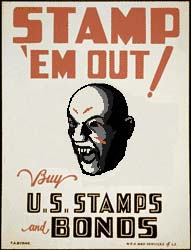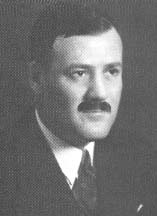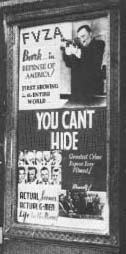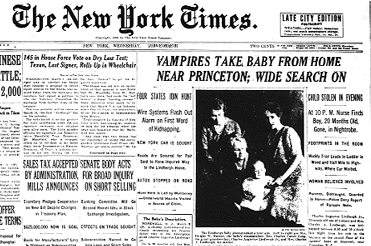

Historical Tales | News | Vampires | Zombies | Werewolves
Virtual Academy | Weapons | Links | Forum
 |
 |
Historical Tales | News | Vampires | Zombies | Werewolves Virtual Academy | Weapons | Links | Forum |
 |
| Savings bonds & stamps helped fund the FVZA. |
 |
| Hilton Dickerson |
Few figures in American history cast as long a shadow as Hilton Dickerson. Born and raised in Saint Louis, Dickerson had cut his teeth hunting vampires and zombies in the West, where he met Roosevelt. Even before he arrived in Washington, Dickerson was renowned for his take-no-prisoners approach. At well over six feet tall, he struck an imposing figure in his customary bearskin jacket. Once he took over at the FVZA, Dickerson conducted a purge of all Agency cronies and hacks. He also stepped up nationwide recruitment and raised the hiring standards for agents.
While Dickerson played the role of Wild West soldier of fortune to the hilt, he was actually a savvy politician expert at using the media to promote himself. When Hollywood came calling, Dickerson hand-picked Tyrone Power to play him in a series of movies called The Night Watch. In addition, Dickerson was the hero of a comic book series, and he produced and narrated a radio show, The Vanguard, based on real-life FVZA cases. Unfortunately, his dramatic instincts were not on par with his vampire-hunting skills, and the show failed to take off. Despite that misstep, his exhaustive public relations work paid big dividends: in a 1930 poll, Americans selected Dickerson as Public Hero Number One.
 |
| Poster for Dickerson- inspired movie |
But Dickerson's ego created an inevitable backlash. The Agency's overzealous pursuit of the undead resulted in significant civilian casualties and occasionally turned public sentiment against the Agency, as in the case of LeDoux Versus the FVZA. Dickerson clashed frequently with President Roosevelt, whom he felt tried to take too much credit for progress in the war on the undead. But in the end, it was a single incident that brought about the demise of Hilton Dickerson.
 |
| New York Times headline; November 5, 1935 |
The rules changed in the post-Dickerson era of the FVZA. Directors were limited to two terms (eight years), and all their decisions had to be rubber-stamped by Congress. The new oversight, combined with a succession of outstanding FVZA directors, transformed an agency that had once been an embarrassment into one of the most respected in government. Ironically, it was the Dickerson-instituted recruitment and training programs that enabled our leaders to draw upon such a large pool of qualified people for the role of America's top vampire and zombie hunter.